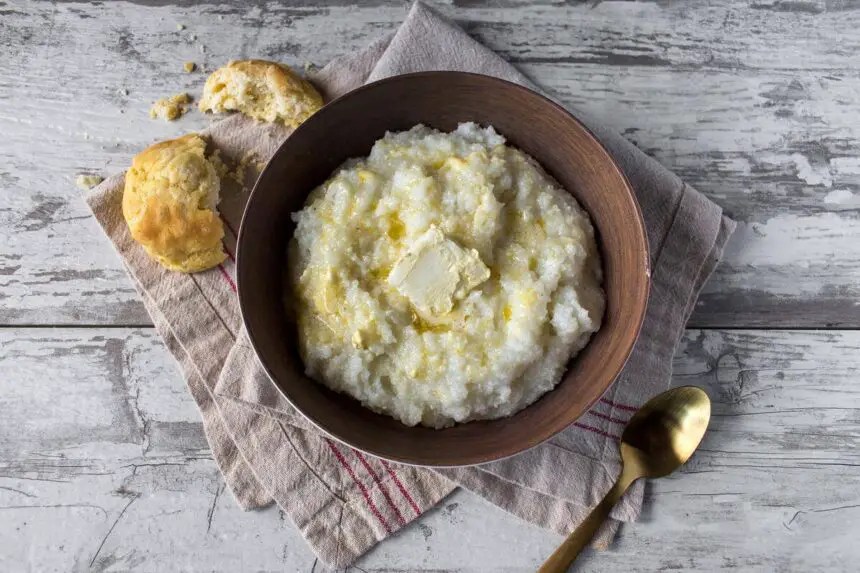Cats are well-known for their finicky eating habits, often turning their nose up at certain foods and preferring others. As a cat owner, it’s natural to want to share some of your own meals with your feline friend, but it’s important to understand what foods are safe and healthy for your cat to eat. One food that may come to mind is grits, a classic Southern dish made from ground cornmeal. So, can cats eat grits? Let’s explore this question further.
What Are Grits?
Grits are a staple of Southern cuisine and are typically made from ground cornmeal that has been boiled with water or milk until it forms a thick, porridge-like consistency. They are often served as a breakfast food, sometimes with cheese or other savory toppings, but can also be served as a side dish with other meals.
Grits can be a good source of carbohydrates and some essential nutrients, such as iron, thiamin, and folate. However, they are also often high in sodium and can be loaded with added fats and sugars if prepared with cheese or other toppings.
Are grits safe for cats to eat?
The short answer is that while grits are not toxic to cats, they are not an ideal food for felines. Cats are obligate carnivores, meaning that their bodies are designed to obtain all of the nutrients they need from animal-based protein sources. While carbohydrates are not necessarily harmful to cats, they are not a necessary part of their diet and can even be detrimental in large amounts.
Cats also have very different nutritional needs than humans, and the addition of ingredients like salt, sugar, and dairy products can be harmful to their health. Grits prepared with cheese, for example, may contain high amounts of fat and lactose, which can cause digestive upset in cats that are lactose intolerant.
In addition, grits are not a complete or balanced source of nutrition for cats. They lack important amino acids, vitamins, and minerals that are necessary for a cat’s overall health and well-being. Feeding your cat a diet of exclusively grits could lead to nutritional deficiencies and health problems over time.
What are the potential risks of feeding grits to cats?
Feeding your cat foods that are not designed for their nutritional needs can
lead to a number of health problems. Some of the potential risks of feeding
grits to cats include:
Digestive upset
Grits are a high-carbohydrate food, and cats’ digestive systems are not
designed to handle large amounts of carbohydrates. Feeding your cat grits can
lead to digestive upset, including diarrhea, vomiting, and stomach pain.
Nutritional deficiencies
As mentioned earlier, grits are not a complete or balanced source of
nutrition for cats. Feeding your cat a diet of exclusively grits could lead to
nutritional deficiencies, which can lead to a number of health problems over
time.
Obesity
Grits prepared with cheese or other high-fat toppings can be very high in
calories. Feeding your cat these types of grits regularly can lead to weight
gain and obesity, which can in turn lead to other health problems.
Lactose intolerance
Cats are generally lactose intolerant, meaning that they cannot digest
lactose, the sugar found in milk and dairy products. Feeding your cat grits
prepared with cheese or other dairy products can cause digestive upset and
other health problems.
What should you feed your cat instead of grits?
If you’re looking for a treat to share with your cat, there are plenty of safe and healthy options available. Here are a few suggestions:
Meat-based treats
As obligate carnivores, cats require a diet that is high in animal-based protein. Offering your cat small amounts of cooked, unseasoned meat as a treat can be a good way to give them a taste of something different while still providing them with the nutrients they need.
Canned cat food
Canned cat food is a convenient and nutritionally complete option for cats. Look for brands that use high-quality animal-based protein sources and avoid those that contain fillers or artificial ingredients.
Catnip
Many cats love catnip, which can be a fun and safe treat for them to enjoy. Just be sure to offer it in moderation, as too much can cause over-stimulation and other unwanted behaviors.
Homemade cat treats
If you enjoy cooking, there are plenty of recipes available online for homemade cat treats. Just be sure to stick to ingredients that are safe and healthy for cats, such as canned tuna or chicken.
In general, it’s important to remember that cats have very specific nutritional needs and should not be fed foods that are not designed for their digestive system. While it may be tempting to share your meals with your feline friend, it’s always best to stick to cat-specific foods and treats to ensure their health and well-being.
Conclusion
In conclusion, while grits are not toxic to cats, they are not an ideal food for felines due to their high carbohydrate content and lack of necessary nutrients. Feeding your cat grits can lead to digestive upset, nutritional deficiencies, and other health problems over time. Instead, stick to cat-specific foods and treats that are nutritionally complete and designed for their digestive system.


